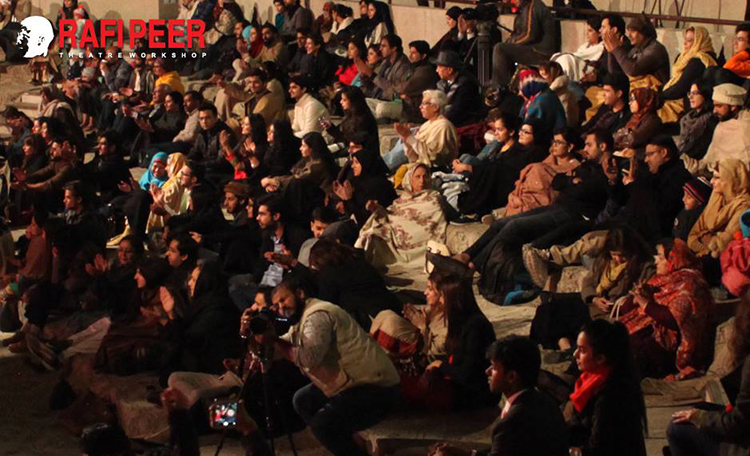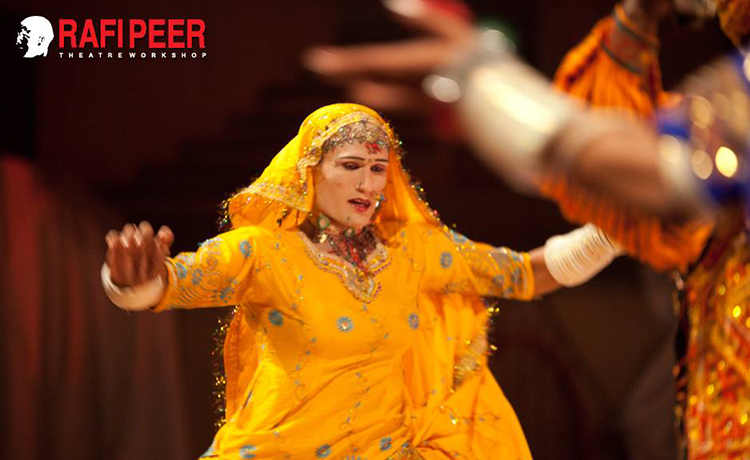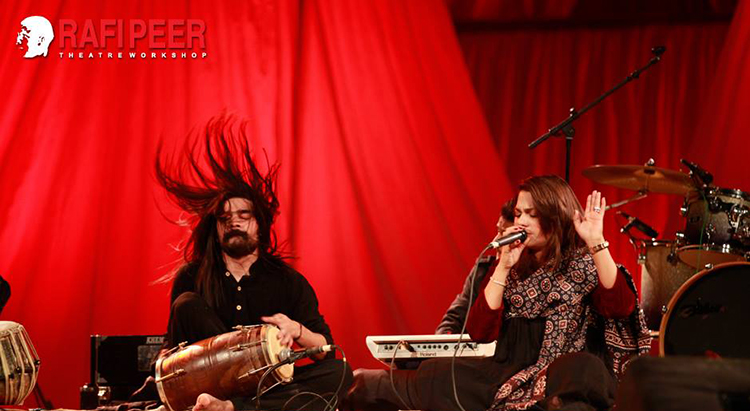Written by: Madiha Shekhani
Posted on: December 14, 2015 | 
Fire show during Krishan Lal Bheel's performance
RPTW has been founded on the same conviction and purpose; in the face of societal constraints and ignorance, it brings to light local culture and indigenous talent that has been on the brink of extinction. It aims to educate people about the vibrant and artistically rich heritage of the nation. With almost four decades of relentless effort, RPTW has been on the frontline in establishing Pakistan as a major cultural hub. It has, quite remarkably, hosted 60 international festivals, provided a platform for over 20,000 foreign artists, and entertained almost 4.5 million people.
The organization is a multifaceted entity that has achieved success in television and film production, theatre production, training and development programs, etc. However, it is most famed for its groundbreaking festivals such as the World Performing Arts Festival, the Saanj Amritsar Festival for Peace, and the Mystic Music Sufi Festival. Late co-founder Faizan Peerzada once explained that when the organization hosted its first international festival in 1992, they wanted the local art scene to serve as a cultural barometer for visiting delegates; to show a side of the country that had largely been ignored by local and international media.

The Mystic Music Sufi Festival was first established back in 2000, with the aim of highlighting the valuable message of Sufi saints and mystics. It challenges widespread notions about our country and religion, and highlights our long-standing traditions of tolerance, harmony, and peace. Moreover, the festival also provides opportunities for local talent that is often overlooked by other platforms such as mainstream media.
In collaboration with the Royal Norwegian Embassy and the Lahore Arts Council, the Mystic Music Sufi Festival returned to Lahore last weekend. The Alhamra Cultural Complex provided the perfect setting for the event: the open air theatre and its Coliseum-inspired architecture complemented the mystical theme of the night. The list of performances featured an amalgamation of various genres – qawwalis, ghazals, folk and contemporary music.
On the opening night, the Badar and Mian Meeri Qawwal groups both paid homage to Bulleh Shah and Lal Shahbaz Qalandar, the beloved saints from Punjab and Sindh. Among the standout performances of the night was Mian Meeri Qawal group’s rendition of Tajdar-e-Haram, a milestone in the world of Qawwalis, originally performed by the Sabri Brothers.

With an assortment of classical instruments, vibrant Rajasthani attire and traditional dancers performing thrilling fire stunts, Krishan Lal Bheel, the celebrated folk singer from Cholistan, captivated the audience. Mai Dhai, the classical folk singer hailing from Tharparkar, gave another memorable performance that was widely appreciated. Mai Dhai is known to command the stage with her strong presence and enthralling voice. One of the first women to internationally represent Sindhi culture, and having performed famous numbers from Coke Studio such as 'Kadi Ao Ni' and 'Anarkali Pharookai', she is a force to be reckoned with. Drawing inspiration from works by Allama Iqbal and Shah Abdul Latif Bhittai, Sanam Marvi and her phenomenal musicians really connected with the audience, giving powerful, upbeat renditions of timeless pieces such as 'Laal Meri Pat'.

One of the event's most awaited performances was by Suraiya Khanum, the legend from Radio Pakistan, who has been spreading the message of the Sufis in various local languages for the last 32 years. Yet once again, she managed to mesmerize the audience with famous pieces such as ‘Ni Mein Kamli Aan’, based on Bulleh Shah's poetry. Noori and Saeen Zahoor's ‘Aik Alif’ was another widely applauded piece. Famous dhol players such as Goonga and Mithu Saeen were also part of the performances.
The line-up for the next two days of the festival was equally exciting, if not more: Rizwan Moazzam Qawwals, Areeb Azhar, Wahdat Rameez, and Pappu Dholia were among the stars who graced the stage. However, the highlight of the entire festival was of course Abida Parveen. Recipient of the Hilal-e-Imtiaz, the second-highest civilian award, she is one of the leading exponents of Sufi poetry, and a true legend.
A tribute to late co-founder Faizan Peerzada, whose vision and drive served as the backbone of the RPTW, the festival was an all-round triumph. Different ethnicities and languages may divide us across provinces, but the message of the Sufis serves to unite us. Festivals that reiterate the message of tolerance, brotherhood and diversity are highly pertinent in contemporary times. In the words of Faizan Peerzada, “This festival is not just a showcase of the region; it is a force of social change.”
You may also like: